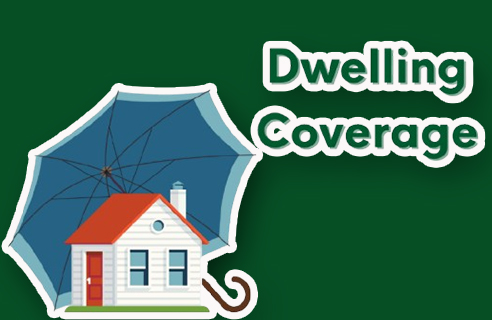What is dwelling insurance? What makes it different from other forms of coverage? If you are interested in learning about what it is all about, let us begin exploring. Dwelling insurance is a part of homeowners insurance that acts as an important financial safety net for homeowners. Not only is the physical structure of your home covered by attached structures like decks and garages.

In other words, dwelling insurance usually offers coverage to the building and the personal belongings in it. Additional living expenses and liability protection are also included. Additionally, theft, fire, vandalism, natural disasters, and other unforeseen events are covered with dwelling insurance.
What Is Dwelling Insurance?
Dwelling insurance is usually interchanged with homeowners insurance, and it is an essential form of financial protection for homeowners. Furthermore, it offers physical structure coverage as well as attached structures like garages and decks. Not only does this form of insurance cover replacement or repair in case of damage but if you are not able to live in your temporarily because of a covered peril, additional living expenses will be disbursed to the policyholder.
How Does It Work?
This form of insurance offers financial protection to policyholder against loss and damage to their homes and attached structures. Other forms of coverage include personal property and liability coverage. But you will need to purchase a policy first, make the premium payment, and file a claim if any issue arises. Hence, you have financial security and peace of mind even if something unpredictable happens.
What Does Dwelling Insurance Cover?
A standard dwelling insurance policy typically covers:
- Personal property.
- Dwelling coverage.
- Other structures of the home.
- Liability protection.
- Medical payments.
- Additional living expenses coverage.
Perils covered include:
- Hail.
- Fire and smoke.
- Wind damage.
- Falling objects.
- Explosions.
- Lightning.
- Water damage.
- Ice, snow, or sleet damage.
- Theft.
- Frozen appliances, plumbing, sprinkler systems, or heat ducts.
- Aircraft damage.
- Vandalism.
- Volcanic eruption.
What Does It Not Cover?
Although a wide range of perils are covered by dwelling insurance, there are also situations in which you will not be getting coverage and they include:
- Earthquakes.
- Floods.
- Sump pump damage.
- Expensive or high-risk items.
- Mudslides.
- Maintenance issues.
- Business activities.
- Service line damage.
- Sewer backup.
- Pest damage.
- Sinkholes.
These perils or events are also influenced by the insurance company you choose.
Who Needs a Policy?
Anyone who has a home or has an interest in a residential property financially should consider purchasing a dwelling surety policy. They include:
- Mortgage holders.
- Homeowners.
- Renters.
- Condo owners.
- Landlords.
Hence, if you want to safeguard your home, personal belongings, and financial health from unforeseen situations, consider getting a dwelling insurance policy.
How Much Does Dwelling Insurance Cost?
Going further, there are many factors that influence or affect the cost of purchasing a dwelling insurance quote. They include the following:
- Coverage limits.
- Location.
- Claims history.
- Value of the home.
- Security features.
- Deductible.
- Credit score.
- Age of the home.
- Rebuilding cost.
- Policy limits.
- Materials of the home.
The cost of dwelling surety can also be affected by the insurance company or insurer you choose.
Nevertheless, on average, in the United States of America, a homeowner is expected to pay several hundred to a few thousand dollars per year to get dwelling insurance. It is important to shop around and compare quotes from various insurance companies.
How To Buy Dwelling Insurance
If you would like to get a competitive price for dwelling insurance, here are the steps you need to begin the procedure:
- Find out the value of your home and the content in it.
- Consider possible risks.
- Determine the coverage limits you need.
- Research various different companies.
- Check their reputation, coverage options, financial stability, and customer reviews.
- Gather several quotes.
- Check the coverage details of every policy.
- Consider additional endorsements.
- Check the policy terms.
- Make inquiries.
- Buy the policy.
- Provide the necessary details.
- Review your dwelling surety quote annually.
With these steps, you can successfully buy a dwelling surety policy that will give you proper protection for your peace of mind and home.
Frequently Asked Questions
How much dwelling insurance coverage do I need?
The amount of dwelling insurance coverage is affected by several factors. For example, your possible liability risks, the replacement cost of your home, and the value of your personal belongings. It is also important that you calculate the amount it costs to replace your personal belongings and rebuild your home to get enough coverage.
Can I adjust my dwelling Surety policy over time?
Certainly, policyholders have the opportunity and right to make changes or adjustments to their dwelling surety policy. This is to show the changes in your coverage needs, the value of your home, renovations, and improvements made. It is advisable to check your policy yearly to make sure you are getting enough protection.
Is flood damage covered by Dwelling Surety?
No, flood damages are not usually covered by dwelling surety. However, as a homeowner, if you live in flood-prone areas, you can get a separate flood insurance policy from a private insurance provider or the National Flood Insurance Program (NFIP).

